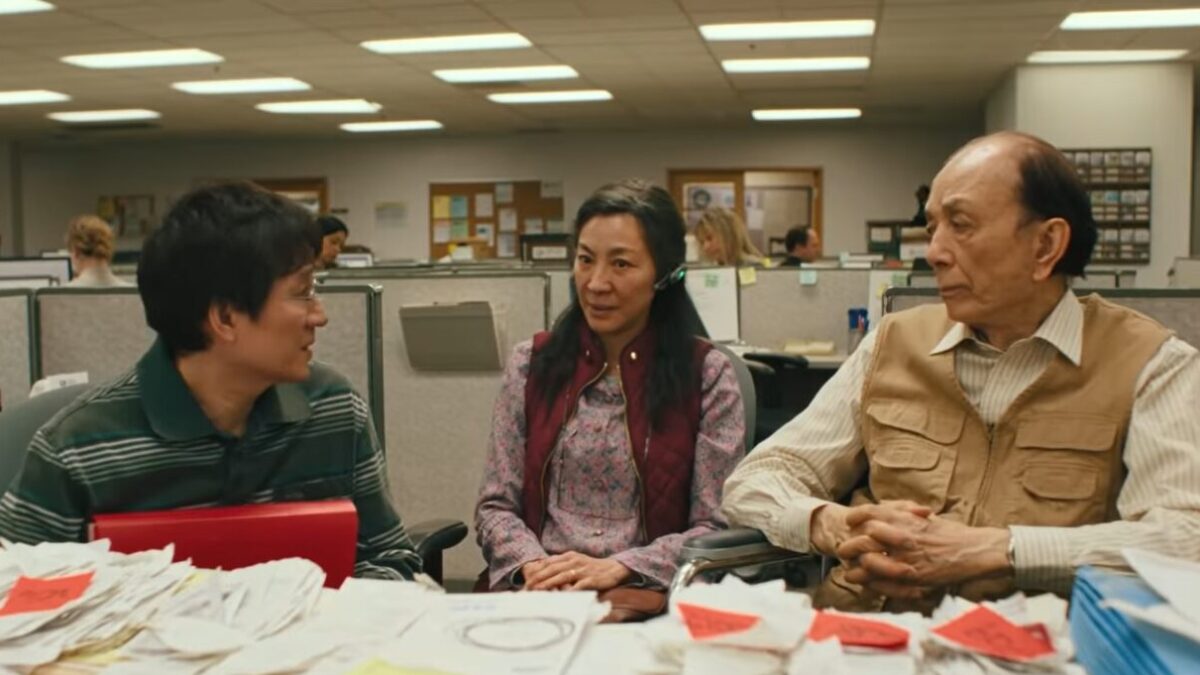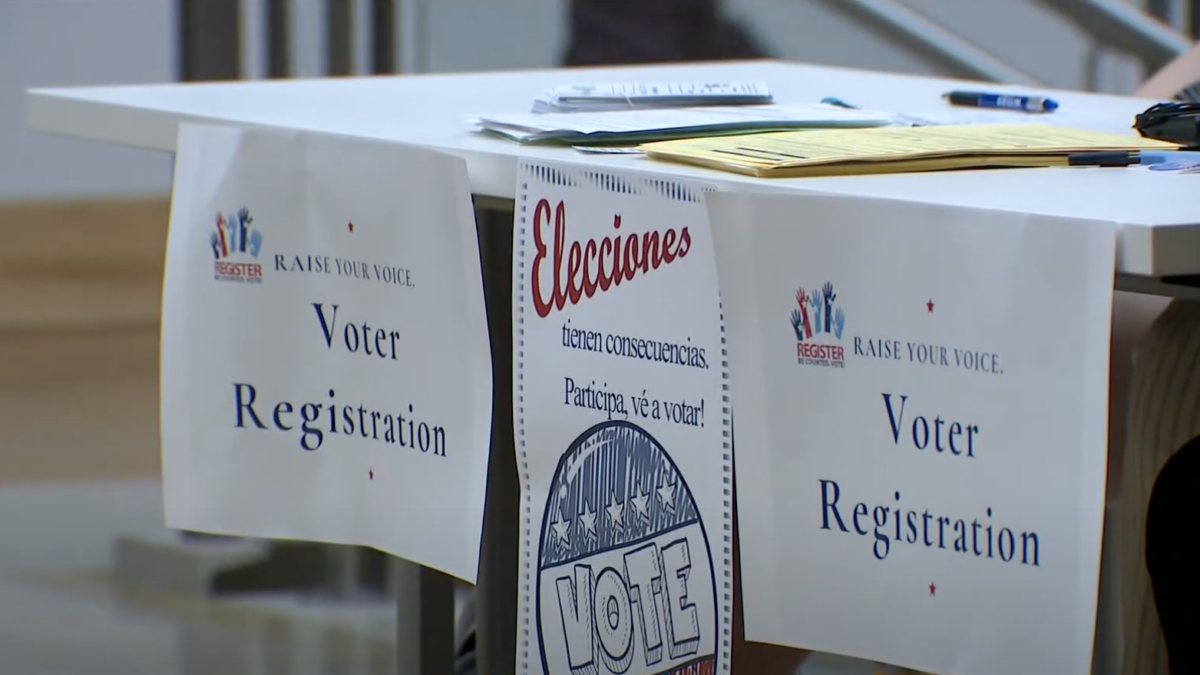This article contains spicy spoilers. Approximately 250,000 on the Scoville Spoiler Scale.
During my down moments in the days of Holy Week preparation and celebration, I repeatedly encountered effusive praise for a film that recently opened in theaters nationwide — a zany, multi-layered exercise in sci-fi mayhem, absurdist comedy, and family drama called “Everything Everywhere All At Once” (henceforth EEAAO). Knowing nothing about the film beyond the rave reviews and the plot being rooted in some sort of multiverse concept, I took advantage of a lazy Easter Monday and booked two tickets to a film I expected to floor me with its bonkers uniqueness and annoy my wife with its bonkers uniqueness.
It’s easy to see why critics loved the film, which currently holds a 97 percent positive rating on Rotten Tomatoes. EEAAO is tender and thoughtful throughout. It’s creative and clever, complex yet easy to follow. It’s delightfully weird and gut-bustingly hilarious in spots, though irredeemably vulgar in others. (In an uncharacteristic move, this humble pastor did not check the film’s rating before purchasing tickets.)
The actors deliver great performances, and the kooky fight scenes are a welcome relief from the copy-and-paste, computer-generated-images-overload action sequences found in the typical sci-fi fare that has filled cineplexes in recent years. In numerous ways, EEAAO is profoundly original.
In the most important way, however, the film is tragically unoriginal. While the film uses its nutty premise to explore deep, aching questions, it offers only shallow answers we’ve already heard countless times before.
Despite the nutso nature of the film, the film’s plot is relatively simple. Evelyn is a Chinese-American immigrant who, in her youth, defied the wishes of the father who never truly accepted her, married a man he didn’t approve of, and sailed off to America. But now she has been drained by the emptiness of existence. She’s mismanaged the finances at her unfulfilling job. Waymond, the husband she’s pushed away, wants a divorce, and she has crushed her daughter Joy’s joy by not sufficiently affirming her lesbian relationship.
Alternate Universe
Evelyn’s banal existence is shattered, however, during her IRS audit. That’s when she learns that an alternate universe version of herself, Alpha Evelyn, made it possible for people to both consciousness-jump into their alternate universe minds and transfer their skills, namely martial-arts related ones, to their alternate universe bodies.
When Alpha Evelyn perceived that her daughter possessed great aptitude for unlocking the power of the multiverse, she pushed her so hard that Joy tapped into the suffering she experienced in countless universes at the hands of her mother, who oppressed her with the rigid judgmentalism she inherited from her father. The influx of infinite suffering then transformed Joy into Jobu Tupaki, a superpowered villain who murders versions of her parents through the multiverse and ultimately seeks the destruction of everything in order to escape the pain of existence.
Jobu Tupaki is thus a deeper villain than you’ll find in most cinematic sci-fi experiences. Her villainy is not formed by lust for power, betrayal, or madness, but by nihilism. She kills to escape the loneliness she feels in the presence of those who love her and whom she loves. She is driven to destructive despair by infinite instances of rejection from those who embrace her.
Despite her daughter’s penchant for multiverse matricide, however, Evelyn will not give up on saving Joy. This is, of course, quite noble, but it’s also what leads to the film’s rather vacuous conclusion. What wondrous feat does Evelyn perform to pierce light into the multiverse of darkness? What great act of heroism does she undertake to heal the unhealable heart of the villain?
‘Be Nicer’
She celebrates her daughter’s lesbian relationship. At the film’s beginning, Evelyn only half-heartedly accepts her daughter’s girlfriend and passes of their relationship as mere friendship to her stuffy, old-world father.
But after Joy internalizes Waymond’s high-drama admonition to “be kind,” she reveals the true relationship to her father and praises Girlfriend With 37 Seconds of Screen Time as this great force of love and forgiveness who completes Joy, just as the husband her father never accepted completes her. This is the act that saves the multiverse, saves the relationship between mother and daughter, and saves the marriage of husband and wife.
There you have it. Inescapable sorrow overcome by LGBTQ affirmation. This is revolutionary stuff we’ve never seen before except in six thousand arthouse films, 8 million television episodes, and 5 trillion viral TikTok videos telling us that embracing people’s gender identity will eternally drive away the sorrow we all know will hound them again in seven months.
The film tells us that unfathomable emptiness can be healed when overbearing authority figures accept their children for who they are — a bold and audacious solution never seen before except when it swirled around 8,000 glittering Disney princesses. The final act declares that we can prevent inevitable destruction by being a smidge nicer to each other. Cinematic ground has not been broken this brazenly since the days of “Rocky IV.”
Generation Fractured Fairy Tale
While it’s fair to fault EEAAO’s director duo known as Daniels (Daniel Kwan and Daniel Scheinert) for their film’s philosophically lackluster ending, it’s also fair to note that their film is reflective of our contemporary culture’s approach to these existential issues. We are a people who speak more than we think and complain more than we consider, which is why we have a strong talent for identifying problems and virtually no aptitude for finding solutions.
Raised in the First Church of Self-Worship, we know what it means to experience emptiness but can’t understand that fulfillment can’t be accomplished with a heavier diet of navel-gazing. We are Generation Fractured Fairy Tale, deluding ourselves into thinking that we can escape the melancholy monster if only our mothers tell us we’re pretty and powerful, our fathers apologize for dashing our dreams with their dastardly wisdom, and we learn to be proud of who our fleeting passions tell us we are.
Finding True Meaning
How, then, should Daniels have offered meaning to a culture that doesn’t know how to find it? Not by repackaging the Disney solution, but by repudiating it. If you ask people to stare at an ocean of emptiness, you won’t comfort them with the suggestion that the emptiness can be conquered if we just make room for everyone on the raft of self-love.
True comfort comes in the promise that there is a God who has filled every drop of the ocean with true love, meaning, and beauty. If you ask people to wrestle with the idea of infinite lonely universes, the only worthwhile comfort comes from pointing them to the Creator who has wrested every atom of His creation away from sin and sorrow and made you one with Him in the sacrifice of His Son.
For decades, films have tried to soothe the pain of rejection by urging us to slather ourselves in the benzocaine of self-affirmation, only to exacerbate the problem when the numbing agent wears off. If you ask your audience to stare into the void of that pain, you need to sew that void shut with something much better than “let’s boost human kindness by ten percent across the board.”
You need to sew it shut with the promise of the One who can kill everything sinful and filthy within you and raise you up as a new creation, perfect and pure. Nietzschean problems require divine solutions, not Instagram moralizing.
If it sounds like I’m saying EEAAO could only find a satisfying conclusion by embracing explicitly Christian themes, that’s because I am. Christ’s atonement, healing, and self-sacrificial example are the only things that can end the existential crises men endure, which means they’re the only things that can cure our culture’s woes, which means they’re the only satisfactory answers to the questions our culture asks through its art.
This is why the parable of the Prodigal Son will still be known in 3,000 years, while “Frozen” will have long since melted in the dustbin of history. Stories about fathers who clothe their sons in sin-destroying, undying grace last because they’re true. Stories about daughters who find salvation by being true to themselves will perish with the narcissistic cultures that create them.
EEAAO’s mixture of martial arts mayhem, dadaist doofery, and frenetic philosophical questions yielded a film that was enjoyable in the moment. But the shallow answers robbed us of a film that mattered once the credits rolled. Daniels could have given us the multiverse of meaning and mercy. Instead, they gave us “The Kung Fu Lesbian Little Mermaid.”
Very 2022. But not very original.









